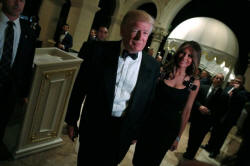|
Trump announced his selection in a statement from his transition
team on Tuesday, saying Lighthizer would help "fight for good
trade deals that put the American worker first."Lighthizer is a
former deputy U.S. trade representative during the Reagan
administration, where he helped to stem the tide of imports from
Japan in the 1980s with threats of quotas and punitive tariffs.
He returns to lead the agency after nearly three decades as a
lawyer representing U.S. steelmakers and other companies in
anti-dumping and anti-subsidy cases, helping to establish import
duties that have reduced Chinese steel imports by billions of
dollars.
Lighthizer, who is with the law firm Skadden, Arps, Slate,
Meagher and Flom, has argued in public testimony that China has
failed to live up to commitments made in 2001 when it joined the
World Trade Organization and that more aggressive tactics are
needed to "force change in the system", even if it means
deviating from WTO rules.
"Years of passivity and drift among U.S. policymakers have
allowed the U.S.-China trade deficit to grow to the point where
is widely recognized as a major threat to our economy,"
Lighthizer wrote in 2010 testimony to Congress's U.S-China
Economic and Security Review Commission.
Lighthizer is regarded as an experienced tactician with an
intimate knowledge of trade tools that were widely used before
the WTO was created in 1995, including "Section 301" tariffs
that were used against Japan in the 1980s to stem a tide of
imports of Japanese steel and vehicles.
(Additional reporting by David Alexander; Editing by Susan
Heavey and Chizu Nomiyama)
[© 2017 Thomson Reuters. All rights
reserved.] Copyright 2017 Reuters. All rights reserved. This material may not be published,
broadcast, rewritten or redistributed.
 |
|




